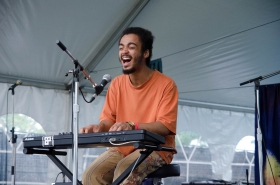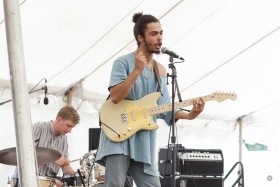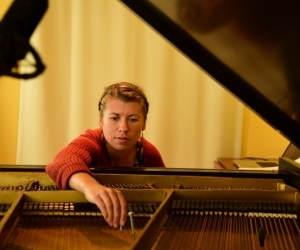Jean-Sebastien Audet and I drink coffee in a café on Toronto’s Queen Street West, as we try to pin down his elusive music. The man who has kindly given us his larger table is now squeezed into a corner with his laptop and is feigning interest in nondescript wall art. He perks up his ears every time Audet speaks. It’s no surprise that he’s drawn into the vortex that is Audet; the intrigue that shrouds the young Montreal-based singer is palpable during our interview. Despite Audet’s candid responses to my questions, his enigmatic quality only heightens, the more he attempts to reveal himself.
Audet, who has recently signed with Anti- Records, is in Toronto to open for his labelmate, the U.S. soul-blues singer-songwriter Curtis Harding. Audet and his bandmates have driven from Montreal to find the club for the gig locked. Later, as we are browsing in a nearby vintage clothing shop, we learn that the show has been cancelled. Harding has not made it past the border.
Audet began creating, producing, and composing music as Un Blonde in 2014. Almost immediately, people began assigning meaning to his arresting moniker. Many understood it as “not blond,” simply because he’s not blond(e). Turns out, it was a syllabic thing. “I wanted a name that had two words, a short word and a longer word—I wanted two and six,” he clarifies. “So Un Blonde is what I settled on, based on the shape. But it has no meaning [intended].” And then there are his album titles—Tenet, Habit Anything, Water the Next Day, and Good Will Come to You—which sound like the titles of intriguing short stories. Audet dispels the notion that they have some kind of deep significance. “My first record title was one word. I went all the way up to five, and my next record will be six words,” he says matter-of-factly. And he politely shrugs off the suggestion that the power of numbers or numerology is behind these artistic choices. “No, there’s no meaning,” he patiently and warmly insists. “It’s arbitrary. It’s some sort of continuity. Conceptualism with no roots.”
To understand Audet’s art, it is best to surrender the desire to figure it out. The same goes for his passionate and, at times, dazzlingly spiritual music—which he says is a constant search for emotions and experiences too difficult to explain, too internalized and fleeting to be categorized or deciphered. Yet he is determined to capture and reflect them as authentically as he can. While discussing the twenty-one-track Good Will Come to You, he recalls someone telling him that a “normal” record is only ten songs. “I have forty-five songs and not one of them says what I want to say [in] an album,” he explains. (A bonus album of unreleased material came out the year after Good Will To You.) In his commitment to be true to those rushing, transitory moments, there is little room for the arduous task of self-analyzing each creation.
Barely into his twenties, yet already on his fifth release, Jean-Sebastien Audet has been called a prodigy. His work draws from punk, psychedelia, folk, soul, R&B, and funk, yet defies all genre labels with its highly original forms and minimalist, DIY execution. Good Will Come to You made the long list of the 2016 Polaris Music Prize, and many remain disappointed that it didn’t make the short. His new album comes out later this year, and where he will go next is something that’s on inquiring minds.
“I can’t remember not being musically inclined,” says Audet. “I guess I only started playing when I was three, but my parents are both hugely active consumers of the arts, music in particular. So it’s kind of like I didn’t have an option,” he says with a laugh. Audet was raised in the church and the sounds of gospel music. His sister sang in the choir and his older brother rapped. He never participated in church choirs, but he gravitated towards what he calls “the conviction and the sentiment of religious music, [as well as] vocational music, technically.” When he was nine, his family moved from Montreal to Calgary. Just a few years later, an important turning point in his life occurred during a family vacation. “I started busking in Europe because I wanted an iPod Touch,” he recalls. “We were there for a month, and I busked everywhere. The places were so tourist-oriented that I was making a lot of money, and I bought one at the end [of the vacation].”
Having tasted the rewards of independence, and with an ease and understanding of performance he may not have learned otherwise, he began busking again, this time in front of a coffee shop back home. He used his earnings to buy records at Hot Wax, a local record store, where he met
improvising multi-instrumentalist and composer Chris Dadge, who was working there as a clerk. Dadge gave Audet his first cassette recorder, taught him how to record himself, and even invited Audet to open for one of his bands. Calgary’s all-ages club scene became a haven for Audet, who would play weekly shows with his band Faux Fur, and meet supportive figures and future collaborators. On the home front, however, his parents, who had celebrated his busking in Europe, grew frustrated with his lack of attention to high school. He somehow squeaked his way through to graduation, and two weeks later he was on his way to Montreal. Once in Montreal he began recording day and night, and Un Blonde was born.
Audet is relentlessly driven by the need for documentation. He tries to record a song a day, a goal that is overwhelming in its scope. The pressure often affects him both physically and socially. “I’m not out and about. I’m always recording in my apartment,” he says. “And I have difficulty tearing myself away from that environment—and that ability to document right away those ideas as they come. I get bad anxiety leaving my apartment. I’m always in the creative process. I don’t have time for anything else.”
His inspirations are intense but brief, and Audet often finds himself consumed by the incessant concern that he won’t be able to articulate and record what he is being called to express. “I always feel I’m not going to make it to the end of a record. I have no time between records because as soon as something is done I have to move on and make something new,” he explains, adding, with a tentative chuckle, “I feel like I just hit the ground running. It sounds bad, but I’m not really concerned with experiencing life, I just want to document whatever happens. So there’s really no settling, and there’s no real enjoyment of the process. It’s all just vicious journaling.”
This desire to capture every day of his life in song has him playing catch up: “I only started recording myself when I was thirteen,” he laughs, although his eyes reveal frustration at the thought of those lost years. And yet in spite of this endless creative upheaval, he remains undeterred.
“I feel like I can express anything in any medium, with any instrument,” says Audet, whose many instruments and pieces of equipment—including a Tascam 424 four-track recorder, Canon Mark III, and a microphone that is basically broken—are always precariously on the edge of falling apart. “I’m really not concerned with how something is being recorded or with what gear—it’s kind of irrelevant.”
His evocative Good Will Come to You was recorded in his Montreal bedroom. Clues about the inspiration for the songs lie in the lovely titles, such as “I Felt the Evening Come through the Window,” “Heat of the Morning,” and “I’m Free.” Audet would hold his microphone out his window to capture whatever sounds happened to be occurring for the length of each track, creating songs in which strangers in the park sound familiar and cars become ocean waves. “I was amazed at the abstract sound of cars. It’s like wind. Not really coming or going at any time. That was one of my favourite sounds of the street. But the park, and the people in the park, I felt like I was maybe invasive to be recording these people, but it was fitting because these were the soundtracks to my recording experience. I was concerned with bringing listeners into the room that I was in.
“Colour, texture, and shape are the main points,” he continues. “Those are my three quickest routes to expressing a feeling, a day, a moment. I don’t really write out any of my lyrics. I work from bar to bar.” And the album’s Zen-like, sunshine-hued cover art illustrates yet another way he attempts to capture the moment—a self-portrait, taken in his room while recording, shows how the light fell through the window.
Surprisingly, for such a private creator, Audet enjoys performing his music in concert. His intimate, dynamic performances often allow fans glimpses of the internal chase that drives his music. Audiences—like the ones for his shows at the 2017 M for Montreal festival and Canadian Music Week in May 2018—are often visibly perplexed and enthralled by his impromptu performance style—stopping and starting songs abruptly, singing a rousing phrase and then abandoning it, and taking thoughtful pauses, as if deciding where to go next. “Stream of consciousness is really important for me to evoke the ever-flowing,” he says. “I want it to be fresh, around the corner. I don’t want to make a song with a verse and chorus. That doesn’t have any interest for me.”
With the intricate music of Un Blonde, Audet is making art for himself. At the same time, he says, “I don’t want to make inaccessible music. I don’t want my music to be intimidating. I want my music to be easy listening, and I want everybody to hear it.”
His heavily lashed eyes light up as he says this, and for that moment there is no mystery about him.
FYI: In December 2018, Audet announced he had ditched the moniker Un Blonde and would henceforth record and perform under the name Yves Jarvis, beginning with The Same But By Different Means, set for release in early 2019.
AUDIO: Staunchly Righteous Non Alignment (2018, composed and performed by Jean-Sebastien Audet. Previously unreleased. Top photo by Unfolding Creative; middle photo (at Wavelength, Toronto) by Cassandra Popescu; bottom photo (Hillside, Guelph) by Tiana Feng.





